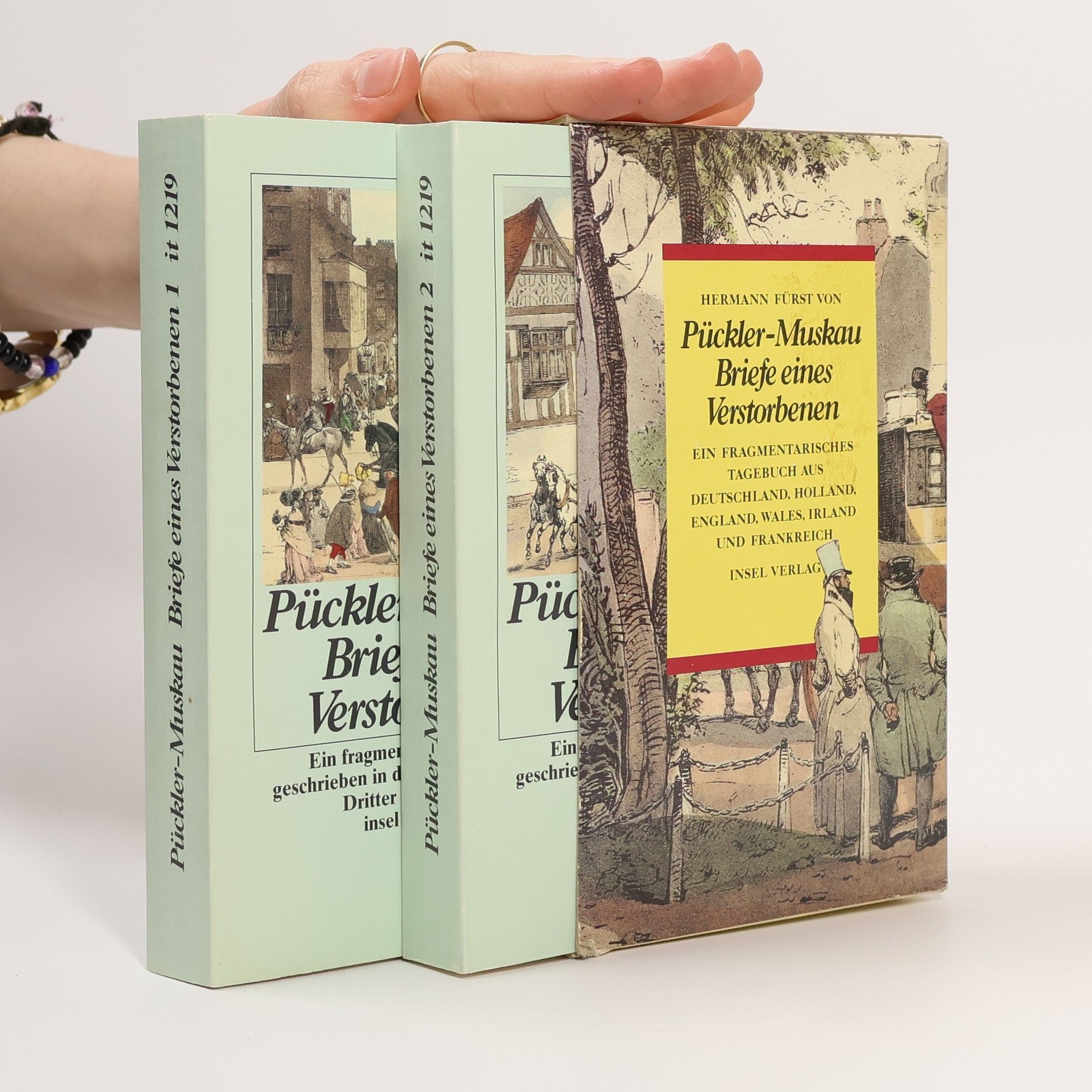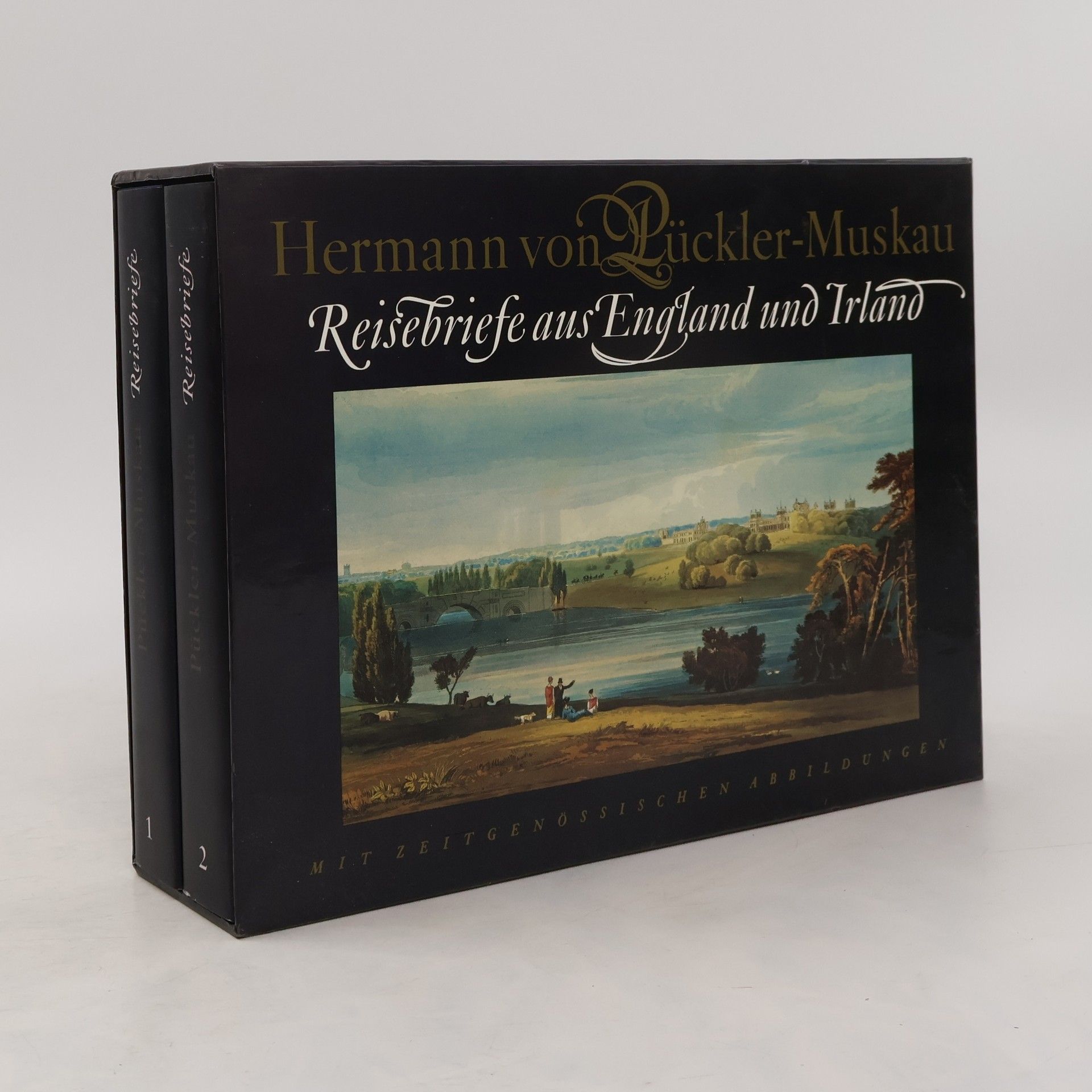Hermann Fürst von Pückler-Muskau, Exzentriker, Lebemann und Gartengestalter, war zugleich ein Schriftsteller von hoher stilistischer Eleganz. Witzig und geistvoll berichtete er seiner Frau Lucie in langen Briefen von seiner berühmten Englandreise 1826 bis 1829. Die Erstausgabe aus dem Jahre 1830, herausgegeben von Varnhagen von Ense, lobte Goethe überschwenglich als ein »für Deutschlands Literatur bedeutendes Werk«. Dieses schönste deutsche Reisebuch, vergleichbar nur Heines »Reisebildern«, erscheint hier vollständig und zum ersten Mal mit einem sorgfältigen kulturhistorischen Kommentar versehen. (amazon.de)
Hermann von Pückler-Muskau Libri
Questo aristocratico tedesco era rinomato non solo come maestro del giardinaggio paesaggistico, ma anche come autore di resoconti di viaggio. I suoi scritti, pubblicati sotto lo pseudonimo di „Semilasso“, documentano vividamente i suoi viaggi attraverso l'Europa e il Nord Africa. Con acuta osservazione e gusto letterario, descrive luoghi esotici e usanze culturali. Le sue opere offrono ai lettori non solo escursioni geografiche, ma anche uno sguardo profondo sulla mentalità e le sensibilità della sua epoca.






Während Mehemet Ali, der in Europa als Despot verschriene Erneuerer Ägyptens, das alte Nilland mit starker Hand von seinen mittelalterlichen Fesseln befreite und nach europäischem Vorbild modernisierte, feierte die noch junge Ägyptologie ihre ersten Triumphe bei der Entdeckung des alten Pharaonenreiches. Die akribische Neugier und ungewöhnliche Bildung Pückler-Muskaus machen seinen Bericht zu einem noch heute gültigen Zeugnis dieser Zeit.
Dopisy zesnulého I. Anglie 19. století očima pruského knížete
- 668pagine
- 24 ore di lettura
Německý šlechtic Hermann von Pückler-Muskau (1785–1871) proslul jako vynikající zahradní architekt a světoběžník. Když jej jeho nákladné záliby přivedly na mizinu, vydal se na britské ostrovy, aby tam hledal bohatou dědičku. Dopisy, které psal své bývalé ženě Lucii (plán na rozvod a bohatou nevěstu z ciziny, která zachrání rodinné panství, pocházel ostatně z její hlavy), vyšly souborně pod názvem Briefe eines Verstorbenen (Dopisy Zesnulého) v letech 1830–1831. Barvité popisy Walesu, Anglie, Irska a Francie či Německa a Nizozemska z pera proslulého bohéma a flouka měly nečekaný a senzační úspěch. Dílo, které Pücklerova žena mezitím nechala anonymně vydat, autorovi, přestože se vrátil domů nejen bez nevěsty, ale i bez haléře, přineslo částečné finanční zajištění a zároveň se – dle literárního historika Güntera J. Vaupela – stalo nejčtenější německy psanou knihou 19. století. Připravovaný první svazek zahrnuje 24 dopisů z let 1826–1828, v nichž Pückler líčí s vtipem svá setkání s vysokou anglickou společností i návštěvy tamních venkovských sídel, umělecké sbírky i proslulé parky.
Hermann Fürst von Pückler-Muskau, Exzentriker, Lebemann und Gartengestalter, war zugleich ein Schriftsteller von hoher stilistischer Eleganz. Witzig und geistvoll berichtete er seiner Frau Lucie in langen Briefen von seiner berühmten Englandreise 1826 bis 1829. Die Erstausgabe aus dem Jahre 1830, herausgegeben von Varnhagen von Ense, lobte Goethe überschwenglich als ein »für Deutschlands Literatur bedeutendes Werk«. Dieses schönste deutsche Reisebuch, vergleichbar nur Heines »Reisebildern«, erscheint hier vollständig und zum ersten Mal mit einem sorgfältigen kulturhistorischen Kommentar versehen. (amazon.de)
Als Erzähler, Berichterstatter und Briefschreiber war Pückler-Muskau sehr fruchtbar. Sein literarischer Ruhm unter den Zeitgenossen gründet sich auf die anonym herausgegebenen "Briefe eines Verstorbenen". Dabei handelte es sich ursprünglich tatsächlich um Briefe an seine Frau, und es war ihre Idee, die Briefe in gedruckter Form zu veröffentlichen. Sie wurden in kurzer Zeit in Deutschland, England und Frankreich zu Bestsellern.
Briefe Eines Verstorbenen: Ein Fragmentarisches Tagebuch, Zweiter Theil
- 382pagine
- 14 ore di lettura
This work has been selected by scholars as being culturally important, and is part of the knowledge base of civilization as we know it. This work was reproduced from the original artifact, and remains as true to the original work as possible. Therefore, you will see the original copyright references, library stamps (as most of these works have been housed in our most important libraries around the world), and other notations in the work. This work is in the public domain in the United States of America, and possibly other nations. Within the United States, you may freely copy and distribute this work, as no entity (individual or corporate) has a copyright on the body of the work. As a reproduction of a historical artifact, this work may contain missing or blurred pages, poor pictures, errant marks, etc. Scholars believe, and we concur, that this work is important enough to be preserved, reproduced, and made generally available to the public. We appreciate your support of the preservation process, and thank you for being an important part of keeping this knowledge alive and relevant.
Der Band beschreibt die Abenteuer des Fürsten Hermann von Pückler-Muskau während seiner Grand Tour, die ihn von 1834 bis 1840 durch das Osmanische Reich führte. Er endet abrupt vor Konstantinopel und ist der letzte seiner sechs Reiseberichte. Der Band enthält die vollständige Erstausgabe von 1846/48 mit Abbildungen und umfangreichen Erläuterungen.


